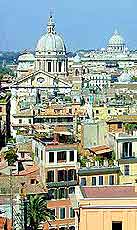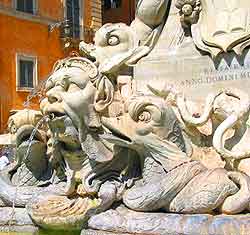Rome Life and Travel Tips
(Rome, Lazio, Italy)

Rome is one of the world's great capital cities and Romans are cheerful, friendly and generally very helpful, although they are possibly less excitable than those in other areas of Italy. Good manners are welcome everywhere and expected by most people. Rome is undeniably a major-league cultural and historic city and worth a visit, whatever the time of year.
Language
Most Italian words are pronounced exactly as they are written, syllable by syllable, and there is often an emphasis on the last letter, e.g. Roma. A knowledge of Latin can be useful, both as the basis for Italian and also for reading the inscriptions on many monuments. Although Italian is the language of the land, English is generally understood at most attractions, museums, hotels and restaurants that cater to visitors. In smaller towns and villages nearby, a phrase book is a useful item to carry.
Tipping
Tipping is quite discretionary, with taxi drivers usually being given a 10% gratuity or thereabouts. Restaurants often include service charges and these are always clearly stated on the menus, although a small tip will still be expected. In Italy, even theatre and cinema usherettes expect a tip for showing you to your seat. Hotel staff, such as luggage handlers, happily accept a small tip. Generally, no other public service workers expect tips. You should always pay tips in cash, as this way you can be sure that the person it is intended for receives it fully.
Places of Worship
It is hardly surprising that Rome brims with Catholic churches as around 85% of Italians are estimated to be Catholic. Of the remaining, the major religions include evangelical Protestants, Jehovah's Witnesses, Muslims and most other religions are represented. There are an enormous number of churches that welcome visitors and some even hold regular masses in English.
Smoking
In many buildings and public transport, rules restrict smoking and this is usually indicated by no-smoking symbols in prominent places. Most pubs and bars welcome customers who wish to relax with a drink and smoke, as a high percentage of Italians are smokers.
It is always worth exercising discretion and sensitivity when selecting a place in which to smoke. The best advice would be not to smoke unless others around you do so.

Tips for Using the Euro
The Euro is made up of eight coins and seven paper notes and was introduced on January 1, 2002. The 12 original members of the European Union - Austria, Belgium, Finland, France, Germany, Greece, Ireland, Italy, Luxembourg, Netherlands,
Portugal, and Spain - planned the event for more than a decade, determining a conversion rate for each country's national currency. The colourful Euro bills, which include holograms and shades of green, yellow, blue, mauve, and orange, are identical across the Euro area. Coins have one common and one national side, but they can be used in any of the 12 countries, regardless of the country of issue. Old currencies are no longer accepted, although they can still be converted to Euros in central banks.
Tourism and Tourist Information
The city's tourist information service (APT) has several offices in Rome. In the central hall at Staziona Termini, there is an office that is open daily from 08:15 to 19:15. The main APT office is situated at Via Parigi 5 and is open Monday to Saturday from 08:15 to 19:15. There are several other smaller branches, including one at the Fiumicino Airport and all have a wide range of information on accommodation, museums, festivals, concert seasons as well as details on local and intercity transport.
Telephones and Emergency Numbers
- Emergencies - for police, fire, or other emergencies, dial 113
- The police headquarters (Questura) is in Via San Vitale 15 - dial 4686
- To call from one city code to another, dial the city code, complete with initial 0, and then dial the number. Numbers in Italy range from four to eight digits in length
- Telephone country codes: United States and Canada is 1, Australia 61, New Zealand 64 and for the United Kingdom 44 (the international prefix from Ireland is 00)
Safety
The biggest threat in Rome is by bag-snatchers and pickpockets. These thieves are very skilled, so be particularly careful with hand baggage. Wear a bag or camera across your body, or even use a concealed money belt.
Taxes
VAT (IVA) is always included in the price and refunds are unusual in Italy. Tourists from countries outside of the EU may claim a refund on this tax if the item was purchased for personal use and cost more than a certain amount. Ask the shopkeeper for details.
 Rome is one of the world's great capital cities and Romans are cheerful, friendly and generally very helpful, although they are possibly less excitable than those in other areas of Italy. Good manners are welcome everywhere and expected by most people. Rome is undeniably a major-league cultural and historic city and worth a visit, whatever the time of year.
Rome is one of the world's great capital cities and Romans are cheerful, friendly and generally very helpful, although they are possibly less excitable than those in other areas of Italy. Good manners are welcome everywhere and expected by most people. Rome is undeniably a major-league cultural and historic city and worth a visit, whatever the time of year.